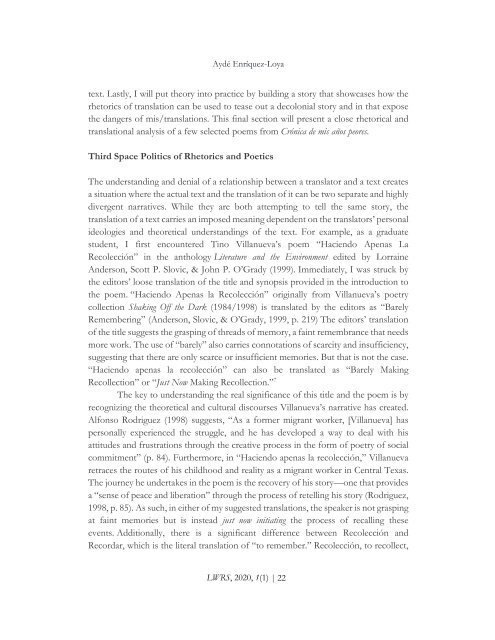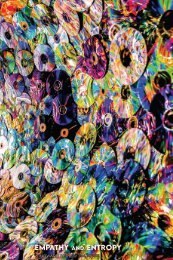LWRS June 2020 Volume 1, Issue 1
Inaugural Issue co-edited by Yndalecio Isaac Hinojosa and Isabel Baca
Inaugural Issue co-edited by Yndalecio Isaac Hinojosa and Isabel Baca
Create successful ePaper yourself
Turn your PDF publications into a flip-book with our unique Google optimized e-Paper software.
Aydé Enríquez-Loya<br />
text. Lastly, I will put theory into practice by building a story that showcases how the<br />
rhetorics of translation can be used to tease out a decolonial story and in that expose<br />
the dangers of mis/translations. This final section will present a close rhetorical and<br />
translational analysis of a few selected poems from Crónica de mis años peores.<br />
Third Space Politics of Rhetorics and Poetics<br />
The understanding and denial of a relationship between a translator and a text creates<br />
a situation where the actual text and the translation of it can be two separate and highly<br />
divergent narratives. While they are both attempting to tell the same story, the<br />
translation of a text carries an imposed meaning dependent on the translators’ personal<br />
ideologies and theoretical understandings of the text. For example, as a graduate<br />
student, I first encountered Tino Villanueva’s poem “Haciendo Apenas La<br />
Recolección” in the anthology Literature and the Environment edited by Lorraine<br />
Anderson, Scott P. Slovic, & John P. O’Grady (1999). Immediately, I was struck by<br />
the editors’ loose translation of the title and synopsis provided in the introduction to<br />
the poem. “Haciendo Apenas la Recolección” originally from Villanueva’s poetry<br />
collection Shaking Off the Dark (1984/1998) is translated by the editors as “Barely<br />
Remembering” (Anderson, Slovic, & O’Grady, 1999, p. 219) The editors’ translation<br />
of the title suggests the grasping of threads of memory, a faint remembrance that needs<br />
more work. The use of “barely” also carries connotations of scarcity and insufficiency,<br />
suggesting that there are only scarce or insufficient memories. But that is not the case.<br />
“Haciendo apenas la recolección” can also be translated as “Barely Making<br />
Recollection” or “Just Now Making Recollection.” 7<br />
The key to understanding the real significance of this title and the poem is by<br />
recognizing the theoretical and cultural discourses Villanueva’s narrative has created.<br />
Alfonso Rodriguez (1998) suggests, “As a former migrant worker, [Villanueva] has<br />
personally experienced the struggle, and he has developed a way to deal with his<br />
attitudes and frustrations through the creative process in the form of poetry of social<br />
commitment” (p. 84). Furthermore, in “Haciendo apenas la recolección,” Villanueva<br />
retraces the routes of his childhood and reality as a migrant worker in Central Texas.<br />
The journey he undertakes in the poem is the recovery of his story—one that provides<br />
a “sense of peace and liberation” through the process of retelling his story (Rodriguez,<br />
1998, p. 85). As such, in either of my suggested translations, the speaker is not grasping<br />
at faint memories but is instead just now initiating the process of recalling these<br />
events. Additionally, there is a significant difference between Recolección and<br />
Recordar, which is the literal translation of “to remember.” Recolección, to recollect,<br />
<strong>LWRS</strong>, <strong>2020</strong>, 1(1) | 22





